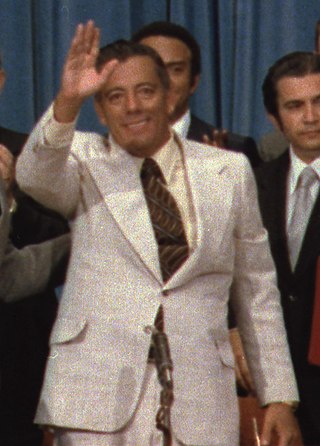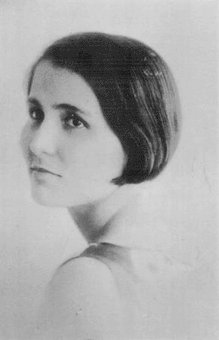Related Research Articles

Panama, officially the Republic of Panama, is a country in Latin America at the southern end of Central America, bordering South America. It is bordered by Costa Rica to the west, Colombia to the southeast, the Caribbean Sea to the north, and the Pacific Ocean to the south. Its capital and largest city is Panama City, whose metropolitan area is home to nearly half of the country's over 4 million inhabitants.

Manuel Antonio Noriega Moreno was a Panamanian politician and military officer who was the de facto ruler of Panama from 1983 to 1989. He never actually served as president of Panama, instead ruling as an unelected military dictator through puppet presidents. Amassing a personal fortune through drug trafficking operations by the Panamanian military, Noriega had longstanding ties with American intelligence agencies before the U.S. invasion of Panama removed him from power.

Omar Efraín Torrijos Herrera was a Panamanian dictator, as well as the Commander of the Panamanian National Guard and military leader of Panama from 1968 to his death in 1981. Torrijos was never officially the president of Panama, but instead held self-imposed and all-encompassing titles including "Maximum Leader of the Panamanian Revolution". Torrijos took power in a coup d'état and instituted a number of social reforms.

Arnulfo Arias Madrid was a Panamanian politician, medical doctor, and writer who served as the President of Panama from 1940 to 1941, again from 1949 to 1951, and finally for 11 days in October 1968.

The Democratic Revolutionary Party is a centre-left political party in Panama founded in 1979 by General Omar Torrijos. It held the presidency from 2019 to 2024 under Laurentino Cortizo.

The Torrijos–Carter Treaties are two treaties signed by the United States and Panama in Washington, D.C., on September 7, 1977, which superseded the Hay–Bunau-Varilla Treaty of 1903. The treaties guaranteed that Panama would gain control of the Panama Canal after 1999, ending the control of the canal that the U.S. had exercised since 1903. The treaties are named after the two signatories, U.S. President Jimmy Carter and the Commander of Panama's National Guard, General Omar Torrijos.

The People's Party of Panama is an unregistered communist party in Panama. It was founded on 4 April 1930 as the Communist Party of Panama, after Panamanian communists broke away from the Labour Party. Early leaders of the PCP included Eliseo Echévez and Cristóbal Segundo. The PCP joined the Communist International and reached its apogee of popularity during and right after World War II. In 1943 the PCP changed its name to the People's Party of Panama.
This article gives an overview of liberalism in Panama. It is limited to liberal parties with substantial support, mainly proved by having had a representation in parliament. The sign ⇒ means a reference to another party in that scheme. For inclusion in this scheme it is not necessary that parties labeled themselves as a liberal party.

The Thousand Days' War was a civil war fought in Colombia from 17 October 1899 to 21 November 1902, at first between the Liberal Party and the government led by the National Party, and later – after the Conservative Party had ousted the National Party – between the liberals and the conservative government. Caused by the longstanding ideological tug-of-war of federalism versus centralism between the liberals, conservatives, and nationalists of Colombia following the implementation of the Constitution of 1886 and the political process known as the Regeneración, tensions ran high after the presidential election of 1898, and on 17 October 1899, official insurrection against the national government was announced by members of the Liberal Party in the Department of Santander. Hostilities did not begin until the 11th of November, when liberal factions attempted to take over the city of Bucaramanga, leading to active warfare. It would end three years later with the signing of the Treaty of Neerlandia and the Treaty of Wisconsin. The war resulted in a Conservative victory, and ensured the continued dominance of the Conservative Party in Colombian politics for another 28 years. Colombia's political structure as a unitary state has not been challenged since.

Clara González (1898–1990) was a Panamanian feminist, lawyer, judge, and activist. She became the first Panamanian woman to earn her Bachelor of Law Degree in 1922. The same year, she created the Partido Nacional Feminista to campaign for women's rights and suffrage. González was central to the work of the Inter-American Commission on Women, collaborating with activists from Latin America and the United States to study the condition of women across the Americas and to recommend reforms. González remained a vital organizer for women's rights in Panama for decades and ran for political office after Panamanian women were granted voting rights in 1945. She later became the first Panamanian woman to serve as a juvenile court judge, where she assisted in drafting the Panamanian juvenile code.

Panama–Russia relations are the bilateral relationships between Panama and Russia. Panama has an embassy in Moscow. Russia has an embassy in Panama. Both countries are full members of the United Nations.

General elections were held in Nicaragua on 4 November 1928 to elect a president, half of the deputies and a third of the senators of the National Congress.

Parliamentary elections were held in Panama on 28 September 1980, electing a new National Legislative Council.

Parliamentary elections were held in Panama on 6 August 1978, electing a new National Assembly of Community Representatives.

Parliamentary elections were held in Panama on 6 August 1972, electing both a new National Assembly of Community Representatives.

General elections were held in Panama on 5 August 1928 to elect both a new President of the Republic and a new National Assembly.
The Labor Party was a Panamanian political party.
The Agrarian Party was a Panamanian small regionalist conservative political party. The party was active in Chiriquí Province in the 1920s and 1940s. The PA was represented in the Panamian Parliament from 1928 to 1936.